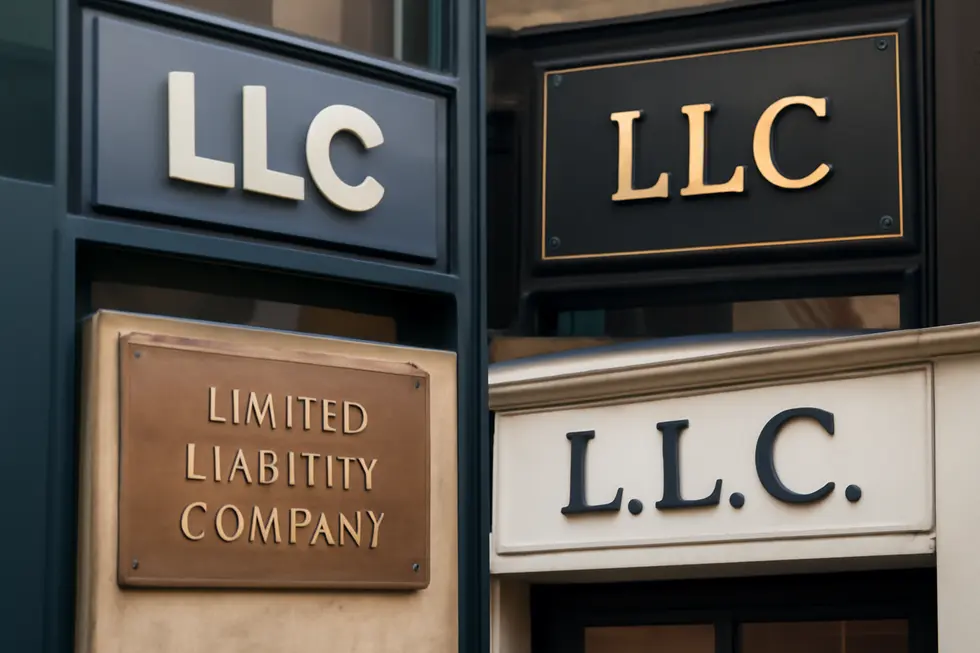Introduction
Choosing an effective LLC business name is a foundational step for any entrepreneur aiming to establish a legally compliant and recognizable brand. The right name not only distinguishes your company in the marketplace but also fulfills key legal requirements pivotal to protecting your business identity. This guide explores vital aspects of LLC naming, starting with the necessity for uniqueness and compliance with state laws. It then explains the importance of including an appropriate LLC designator to signal liability protection. Business owners will gain insight into restricted terms that could jeopardize legal standing or confuse stakeholders. We further delve into trademark considerations and valuable online tools to safeguard against infringement and secure your digital presence. Finally, we’ll cover the practical procedures and resources available for reserving and registering LLC names, ensuring your business name journey is smooth and secure. Each chapter builds towards empowering entrepreneurs to confidently select a name that supports their brand and legal integrity.
Tables of Contents
Chapter 1: Uniqueness and Legal Requirements for LLC Business Names
- Navigating Legal Boundaries to Guarantee Unique LLC Business Names
- Mandatory LLC Designators and Legal Naming Standards for Compliance
- Navigating Legal Boundaries: Restrictions and Prohibited Terms in LLC Naming
- Securing Your LLC’s Identity: Navigating Trademark Law and Intellectual Property Protection
- How State Differences Shape LLC Naming Rules and the Strategic Use of DBAs
Chapter 2: Essential Role of LLC Designators in Business Naming Conventions
- Mandatory Legal Standards for Using LLC Designators in Company Names
- Why Including the LLC Designator is Essential for Legal Identity and Clarity
- How State Regulations Shape the Mandatory Use of LLC Designators in Business Names
- Legal and Practical Risks of Omitting the LLC Designator in Your Business Name
- Balancing Legal Identity and Brand Appeal: Marketing and DBA Strategies for LLC Naming
Chapter 3: Navigating Restricted and Prohibited Terms in LLC Business Names
- Decoding Legal Restrictions: What Words Are Off-Limits in LLC Naming?
- Navigating Financial and Banking Term Restrictions in LLC Naming Compliance
- Navigating Professional Licensing and Title Restrictions in LLC Names
- Navigating Government-Related and Misleading Terms in LLC Naming Regulations
- Navigating State-Specific Restrictions and Compliance for LLC Naming
Chapter 4: Trademark Considerations and Online Checks for LLC Business Names
- Ensuring Unique and Protected LLC Names Through State and Federal Searches
- Navigating Federal Trademark Protections and Enhancing Online Brand Security for LLC Names
- Securing Your LLC’s Digital Footprint: Domain and Social Media Alignment in Trademark Searches
- Ensuring Brand Consistency and Legal Security through Social Media Handle Verification for LLC Names
- Ensuring Legal Compliance and Brand Protection Through Effective LLC Name Searches
Chapter 5: Step-by-Step Guidance on Reserving and Registering Your LLC Business Name
- Navigating Name Availability Searches and State Requirements for LLC Registration
- Mastering the Name Reservation Application: Steps, Fees, and Strategic Benefits
- Navigating the Formal Registration Process: From Name Reservation to Filing Articles of Organization
- Navigating LLC Name Registration: Essential State Searches and Federal Trademark Protection
- Streamlining LLC Name Reservations and Registrations Through State Portals and Formation Services
Chapter 1: Uniqueness and Legal Requirements for LLC Business Names

1. Navigating Legal Boundaries to Guarantee Unique LLC Business Names
Ensuring a genuinely unique LLC business name requires navigating strict legal mandates designed to protect both consumers and existing businesses. States demand that LLC names be distinguishable and include a clear LLC designator such as “LLC” or “L.L.C.” to accurately represent the limited liability nature of the entity. Beyond state databases, checking against federally registered trademarks via the USPTO is essential to avoid infringement risks that can lead to expensive disputes or forced rebranding. Entrepreneurs must also consider the digital landscape, verifying domain and social media handle availability to safeguard their brand’s online identity. Many states offer name reservation options, providing valuable time to prepare formation documents while securing the chosen name. Following these steps thoroughly helps prevent business name conflicts and ensures compliance. For further insight on protecting your LLC’s business name through trademark law, explore detailed guidance at trademark2go.com/trademark-protection-business-name-logo/
2. Mandatory LLC Designators and Legal Naming Standards for Compliance
A key legal requirement for LLC business names is the inclusion of a proper LLC designator, such as “LLC,” “L.L.C.,” or “Limited Liability Company.” This signals the company’s limited liability status and distinguishes it from other entities like corporations. Every state mandates this inclusion to ensure transparency and legal clarity. Beyond the designator, names must avoid restricted terms—like “bank” or “insurance”—unless authorized, and may not imply government affiliation or misrepresent the company’s structure by using terms such as “Corporation” or “Inc.” Courts and regulators use these conventions to prevent confusion and maintain public trust. While marketing materials need not display the designator, official documents must consistently include it. For a thorough understanding of naming compliance and to conduct availability searches, exploring resources focused on trademark protection for business names can be invaluable.
3. Navigating Legal Boundaries: Restrictions and Prohibited Terms in LLC Naming
LLC business names must comply with stringent legal restrictions to avoid consumer confusion and maintain transparency. Crucially, every name must include an approved designator such as “LLC” or “Limited Liability Company” to clearly convey its structure. Names containing words that imply government affiliation (like “Federal” or “County”) or regulated sectors (such as “Bank” or “Insurance”) are generally prohibited unless granted specific authorization. Similarly, professional titles like “Attorney” or “Architect” require proper licensure before use. To prevent misrepresentation, terms suggesting a different entity type, like “Corporation,” are disallowed. Offensive or illegal language is strictly forbidden in all cases. These restrictions vary by state and often demand thorough availability checks against official databases and trademark registries to confirm uniqueness and compliance. This careful vetting safeguards both the LLC’s legal standing and public trust, emphasizing the importance of understanding and adhering to naming prohibitions when establishing a distinct, lawful LLC identity. For detailed insights on naming rules, consider exploring resources such as the authoritative guide on company name protection available at trademark2go.com.
4. Securing Your LLC’s Identity: Navigating Trademark Law and Intellectual Property Protection
Ensuring your LLC business name is unique requires careful attention to trademark law and intellectual property rights. A thorough state-level name search prevents duplications within your jurisdiction, while checking the U.S. Patent and Trademark Office database safeguards against federally registered trademarks. This dual approach minimizes legal risks and brand confusion. Beyond registration, securing domain names and social media handles is vital for a cohesive online presence. While LLC name registration protects you locally, federal trademark registration offers broader protection, allowing you to legally defend your brand against infringement. Consider registering your trademark to enhance brand security and avoid costly disputes. For practical guidance on these steps, consult detailed resources focused on trademark protection for business names.
5. How State Differences Shape LLC Naming Rules and the Strategic Use of DBAs
State-specific regulations for LLC names require inclusion of a clear LLC designator and uniqueness within the state. Naming rules and restrictions, such as reserved words or prohibited terms, differ widely between states, influencing name availability and registration processes. Many states allow reserving a name before formation, providing extra protection. Meanwhile, a DBA (“Doing Business As”) offers businesses operational flexibility by enabling use of alternate names without changing their official LLC name. However, DBAs lack exclusive rights unless trademarked, and multiple DBAs can share the same name if allowed locally. Understanding these nuanced differences between LLC legal names and DBAs is essential to maintain compliance and brand clarity. For further guidance on intellectual property protection relating to business names, exploring resources on trademark protection is highly beneficial.
Chapter 2: Essential Role of LLC Designators in Business Naming Conventions

1. Mandatory Legal Standards for Using LLC Designators in Company Names
Every U.S. state mandates that an LLC’s official business name includes a clear designator such as “LLC,” “L.L.C.,” or “Limited Liability Company.” This requirement signals the entity’s limited liability status, informing clients, suppliers, and regulators alike. The designator must be part of all legal documents, including registration filings and contracts, ensuring transparency about the company’s legal structure. While marketing materials aren’t legally bound to include this designation, doing so can foster trust. States also restrict certain words like “bank” or “insurance” in LLC names unless properly authorized, preventing public confusion. Neglecting the designator risks losing liability protection, exposing owners to personal financial responsibility. For detailed insights on naming and trademark restrictions, business owners can explore valuable guidance at trademark2go.com/company-name-copyright-registration.
2. Why Including the LLC Designator is Essential for Legal Identity and Clarity
Incorporating the LLC designator—such as “LLC,” “L.L.C.,” or “Limited Liability Company”—within a business name is vital to clearly communicate its legal structure and limited liability protections. This designation legally separates the personal assets of members from business liabilities, signaling to clients, partners, and financial institutions the company’s distinct status. Every state mandates the inclusion of this identifier to ensure transparency and to prevent confusion with corporations or partnerships. Beyond compliance, it enhances the business’s credibility and consistency across legal documents, contracts, and tax filings. This official marker safeguards legal clarity and reinforces trust by explicitly defining the company’s liability framework. For comprehensive guidance on safeguarding your business name and brand identity, exploring resources on trademark protection can be invaluable.
3. How State Regulations Shape the Mandatory Use of LLC Designators in Business Names
LLC naming conventions vary widely across states, but a universal requirement is the inclusion of a clear LLC designator, such as “LLC,” “L.L.C.,” or the full “Limited Liability Company.” This legally signals the entity’s limited liability status. States like Pennsylvania emphasize uniqueness and allow numerals and abbreviations, while restricting sensitive words such as “Bank” or “Insurance” without approval. Some jurisdictions impose additional rules for licensed professionals, mandating designators like “PLLC.” Omitting the LLC designator in official filings risks personal liability, though marketing materials offer flexibility. Entrepreneurs must carefully verify their desired name against state databases and understand local restrictions to ensure compliance. For further insights on protecting business names, reviewing trademark implications is recommended.
4. Legal and Practical Risks of Omitting the LLC Designator in Your Business Name
Omitting the required LLC designator from your business name breaches state regulations and can trigger serious consequences. States mandate inclusion of “LLC,” “L.L.C.,” or “Limited Liability Company” to clearly define your business structure. Without this, filings may be rejected, or worse, the LLC could face administrative dissolution. Beyond official documentation, omitting the designator jeopardizes your personal liability protection, as third parties might not recognize the shield LLC status provides. This oversight also risks public confusion and potential legal disputes, since customers and regulators can misinterpret your business entity. Often, operating without the LLC suffix means you must register a fictitious or “doing business as” (DBA) name, which adds complexity and limits use of the LLC designation. Ensuring compliance preserves not only legal standing but also your critical liability protections. For nuanced guidance on name registration and protecting your brand, visit trademark2go.com/trademark-protection-business-name-logo/.
5. Balancing Legal Identity and Brand Appeal: Marketing and DBA Strategies for LLC Naming
Including the LLC designator in business names is legally mandatory for official registration, clearly indicating limited liability status. However, from a marketing perspective, the designator’s presence is optional and often omitted in branding materials for a cleaner, more consumer-friendly look that aligns with the company’s image. Many LLCs complement legal compliance with a DBA (Doing Business As) name, which allows operations under a distinct, marketable name without the “LLC” suffix, enhancing brand flexibility. Ensuring both the legal name and any DBA comply with state regulations avoids confusion and maintains authenticity. This strategic naming approach supports trust and clarity while adapting to diverse marketing goals. For further insight into trademark protection of business names and logos, see trademark2go.com/company-trademarks-logos/
Chapter 3: Navigating Restricted and Prohibited Terms in LLC Business Names

1. Decoding Legal Restrictions: What Words Are Off-Limits in LLC Naming?
Choosing an LLC business name involves strict legal rules designed to prevent confusion and misrepresentation. Names must include a proper LLC designator like “LLC” or “L.L.C.” and be unique within the state, as slight variations in punctuation or capitalization do not suffice. Key restrictions bar terms related to banking, government, or licensed professions unless authorized—such as “Bank,” “FBI,” or “Attorney”—to avoid misleading the public. Using words like “Inc.” or “Corp.” for an LLC is prohibited, as is employing offensive or trademark-infringing terms. Many states explicitly disallow names suggesting government ties without permission, reinforcing transparency. Adhering to these rules ensures smooth registration and shields owners from legal disputes. For a deeper dive into protecting your LLC’s name from infringement, refer to comprehensive trademark resources.
2. Navigating Financial and Banking Term Restrictions in LLC Naming Compliance
LLC names are carefully regulated to prevent misuse of financial and banking terminology such as “bank,” “insurance,” or “trust.” These terms often suggest regulated or government-affiliated entities, so most states require explicit permission or licensing before allowing their use in LLC names. This careful oversight helps avoid consumer confusion and misrepresentation. States like Georgia, Delaware, and Nevada maintain strict rules that block LLCs from using these sensitive terms without approval. Including the official LLC designator (e.g., “LLC” or “L.L.C.”) is mandatory, reinforcing the company’s legal status and differentiating it from corporate or governmental institutions. Business owners must check both state databases and trademark registries to ensure compliance and name availability. For further guidance, exploring specialized resources such as trademark protection for business names and logos can be invaluable in navigating these legal complexities.
3. Navigating Professional Licensing and Title Restrictions in LLC Names
LLC business names must strictly avoid terms that imply unearned professional credentials or licensure. Words like “Attorney,” “Doctor,” or “Architect” can only be used if the LLC’s members hold the necessary state licenses. This ensures public trust and prevents misleading representations. Professionals often form Professional Limited Liability Companies (PLLCs) when permitted, subject to additional state approvals and regulatory oversight. Furthermore, LLC names cannot contain terms that falsely suggest incorporation status such as “Inc.” or “Corp.” Careful compliance with these naming rules prevents legal disputes and confusion. Entrepreneurs should consult state-specific guidelines and perform thorough name checks to respect professional title restrictions and maintain a clear, compliant identity. For further insight into protecting business names, see trademark protection business name logo.
4. Navigating Government-Related and Misleading Terms in LLC Naming Regulations
LLC business names must avoid government-related and misleading terms to prevent public confusion and misrepresentation. Names suggesting ties to government agencies, such as “FBI” or “Federal,” are strictly prohibited without authorization, as they falsely imply official endorsement. Likewise, terms that denote other business structures, like “Inc.” or “Corp.,” are disallowed to maintain legal clarity about the LLC’s status. Additionally, words linked to regulated professions—”Bank,” “Attorney,” or “CPA”—require special licenses before use, safeguarding consumer trust in these fields. State laws vary slightly, but all enforce these core restrictions rigorously to protect consumers and reflect accurate legal identities. For thorough compliance, consulting state registries or legal experts is essential. This ensures an LLC’s name upholds both professionalism and statutory requirements while avoiding misleading impressions. For more guidance, business owners can explore detailed resources on trademark protection for business names and logos.
5. Navigating State-Specific Restrictions and Compliance for LLC Naming
LLC naming rules vary by state, yet all maintain core requirements: uniqueness, an LLC designator, and avoidance of restricted terms. States enforce strict rules against names implying government ties, such as “Federal” or “Treasury,” without prior approval. Financial words like “bank” or “insurance” often require licensing or are prohibited to prevent public confusion. Some states, like Colorado, reject names differing only by punctuation or capitalization, while New Hampshire explicitly bans government-affiliated terms. Offensive or misleading words are also disallowed to uphold legality and public decency. Entrepreneurs must verify availability via their Secretary of State and the USPTO databases to avoid infringement and confusion. Many states permit reserving LLC names to secure them during formation. Understanding these nuances ensures legal compliance and clear brand identity, essential for successful business registration.
Chapter 4: Trademark Considerations and Online Checks for LLC Business Names

1. Ensuring Unique and Protected LLC Names Through State and Federal Searches
Choosing an LLC business name involves careful scrutiny to ensure uniqueness and legal compliance at the state level. The name must incorporate an LLC identifier such as “LLC” or “Limited Liability Company” and avoid restricted or misleading terms. Conducting a thorough state business name search via the Secretary of State’s database confirms availability and compliance. Beyond state verification, a federal trademark search through the USPTO database is vital to circumvent conflicts with federally registered trademarks that risk costly disputes. While not obligatory, registering a trademark at the state or federal level enhances brand protection. Equally important is verifying domain and social media name availability to maintain consistent digital branding. Should a name change occur, updating state records and repeating these checks ensures continued legal standing. This integrated strategy safeguards your LLC name’s uniqueness and strengthens its identity both locally and online. For deeper trademark insights, explore detailed guidance on trademark protection for business names.
2. Navigating Federal Trademark Protections and Enhancing Online Brand Security for LLC Names
Securing your LLC business name through federal trademark registration offers critical protections beyond state-level registration. While state registration prevents local duplication, federal registration with the USPTO grants exclusive nationwide rights, safeguarding your brand from infringement and unauthorized use. Conducting a thorough trademark search via the USPTO’s TESS system is essential to identify existing marks similar in spelling, pronunciation, or industry. Federal trademarks empower you to enforce your rights legally through federal courts and combat cybersquatting or unauthorized social media use, reinforcing your online brand presence. Although the process involves fees and formal applications, this proactive step establishes your LLC’s unique identity, reduces costly disputes, and ensures consistent recognition across all jurisdictions. For deeper guidance, explore resources on comprehensive trademark protection for business names.
3. Securing Your LLC’s Digital Footprint: Domain and Social Media Alignment in Trademark Searches
Choosing an LLC name requires diligent checks beyond state registries to establish a robust online identity. After confirming name availability within your state and through the USPTO trademark database, verifying domain name availability is crucial. Securing a domain—ideally a .com—that mirrors your LLC name ensures consistent branding and prevents cybersquatting. Alongside domains, confirming social media handle availability fosters cohesive visibility across platforms, though these handles lack legal trademark status. For a thorough approach, combine trademark searches with domain and social media audits, including variations and alternative top-level domains. This integrated process supports confident brand protection and smooth digital presence establishment, critical for avoiding infringement issues and strengthening customer recognition. Additional insights on protecting your business name can be found in trademark protection for business names and logos.
4. Ensuring Brand Consistency and Legal Security through Social Media Handle Verification for LLC Names
Social media handle verification is a crucial extension of trademark and online name checks when selecting an LLC business name. While confirming a name’s availability via state databases and the USPTO protects legal rights, matching social media handles ensure consistent branding and reduce confusion. Since these handles often represent a business’s primary public interaction point, securing them helps establish authenticity and trust. Verification badges on platforms like Instagram and Twitter further confirm official identity, deterring impersonation. Additionally, AI-powered monitoring tools help detect misuse of trademarks online, enabling proactive protection. Integrating this step supports a cohesive, legally sound digital presence that complements traditional trademark safeguards. For deeper insights into trademark protections, consult resources on trademark protection for business names and logos.
5. Ensuring Legal Compliance and Brand Protection Through Effective LLC Name Searches
Choosing an LLC business name requires navigating state-specific regulations and trademark laws to guarantee uniqueness and legal compliance. Every LLC name must include an official designator like “LLC” and avoid restricted words that confuse the business’s nature. Conducting a comprehensive search is crucial: start with the Secretary of State’s database to confirm the name’s availability within the state. Then, check the USPTO trademark database to avoid conflicting federally registered trademarks that could lead to disputes. Equally important is verifying domain and social media availability to secure a consistent brand presence online. Noncompliance can result in registration rejection or legal challenges, underscoring the need to understand both regulatory restrictions and trademark protections. For a detailed step-by-step approach, resources like trademark protection for business names and logos offer valuable insights.
Chapter 5: Step-by-Step Guidance on Reserving and Registering Your LLC Business Name

1. Navigating Name Availability Searches and State Requirements for LLC Registration
Securing your LLC business name begins with a thorough name availability search using the Secretary of State’s online portal in your state. This step confirms that your desired name is unique, compliant with formal requirements—such as including “LLC” or its equivalents—and avoids prohibited terms like “bank” or references implying government ties. After verifying availability, you can often reserve the name by submitting a request and paying a nominal fee, typically valid for about 120 days, allowing time to prepare formation documents without risking loss of your name. Registration occurs formally when filing your Articles of Organization, officially establishing your LLC and registering its name. Because state rules and fees vary, consulting your state’s Secretary of State website ensures compliance. Additionally, it’s wise to check trademarks and domain name availability to protect your brand identity. For a comprehensive understanding of business name protection through intellectual property, consider reviewing resources on trademark protection for business names and logos. This integrated approach streamlines your LLC name reservation and registration while safeguarding your brand’s uniqueness and legal standing.
2. Mastering the Name Reservation Application: Steps, Fees, and Strategic Benefits
Securing an LLC name starts with a vital step: the name reservation application. This process typically begins by conducting a thorough name availability search using the state’s Secretary of State business registry to confirm the desired LLC name is unique and compliant. Entrepreneurs then submit a reservation application—either online, by mail, or in person—accompanied by a fee that generally ranges from $10 to $50, depending on the state. Name reservations hold your exclusive right to use the chosen name for a limited period, usually between 60 and 120 days, giving you time to prepare and file your formation documents without losing the name to competitors. For example, California offers a 60-day reservation with payable renewal, while Arizona allows 120 days, with expedited filing options. After reserving the name, filing Articles of Organization with the applicable fee finalizes the official registration. Though optional in most states, name reservation is a strategic tool to protect your brand early in the LLC formation process. For detailed guidance on safeguarding your business name, exploring comprehensive trademark protection methods can be invaluable.
3. Navigating the Formal Registration Process: From Name Reservation to Filing Articles of Organization
Successfully reserving and registering an LLC business name requires careful attention to state-specific procedures, beginning with a thorough name availability search using the Secretary of State’s database to confirm compliance and uniqueness. Entrepreneurs often choose to reserve their desired name, paying a nominal fee to secure exclusive use while preparing formation documents. The critical step is filing the Articles of Organization—sometimes called the Certificate of Formation—detailing the LLC’s official name, registered agent, business purpose, and management structure. This process involves submitting required forms and fees to the state authority. Beyond formal documents, appointing a registered agent and drafting an Operating Agreement solidify the LLC’s foundation. Obtaining an EIN from the IRS follows to enable tax and banking functions. Maintaining legal standing also entails adherence to annual filings or publication mandates where applicable. Utilizing specialized guides and state resources ensures compliance at every step, streamlining your LLC’s official launch and protecting your chosen business identity. For more on protecting your LLC name, explore trademark guidance on trademark2go.com.
4. Navigating LLC Name Registration: Essential State Searches and Federal Trademark Protection
Reserving and registering an LLC name begins with a thorough state-level availability search through the Secretary of State’s database. Many states offer the option to reserve a name, temporarily securing your choice while preparing formation documents by submitting a reservation application and fee. Beyond state registration, conducting a federal trademark search using the USPTO database is vital to ensure your LLC name doesn’t infringe, preventing costly disputes. Unlike state registration, securing a federal trademark protects your brand nationwide, offering exclusive rights to your business name or logo. This combined process of state reservation and federal trademark consideration forms the foundation of legally compliant, distinct, and protected LLC naming strategies. For detailed guidance, consulting the Secretary of State’s website and resources on trademark protection for business names provides comprehensive support.
5. Streamlining LLC Name Reservations and Registrations Through State Portals and Formation Services
Reserving and registering an LLC name begins with a thorough search on your state’s Secretary of State online portal to ensure the name is unique and compliant. Many states allow you to file a name reservation application, holding the name for a period ranging from 30 days to a year with a nominal fee. Following reservation, the formal registration occurs by submitting Articles of Organization electronically or by mail, accompanied by filing fees. State portals facilitate this process with user-friendly databases and electronic forms, reducing processing time. For added convenience, professional LLC formation services manage name searches, reservations, filings, and ongoing compliance, easing complexity for entrepreneurs. Conducting a parallel trademark search is essential to avoid federally protected names. Utilizing this combined approach of online tools and expert services secures your LLC’s identity efficiently and legally. For more on protecting your business name, explore guidance on trademark protection for business names and logos.
Final thoughts
Selecting and securing an LLC business name is a multifaceted process essential to building a compliant and recognizable company identity. Ensuring the name is unique within your state protects you from legal conflicts and marketplace confusion. Including the correct LLC designator clearly signals your business structure and liability protections. Avoiding restricted terms safeguards your reputation and prevents legal obstacles. Incorporating trademark research and online presence checks helps defend your brand against infringement and enhances online coherence. Finally, understanding the procedures for reserving and registering business names leverages state resources to lock in your ideal name proactively. This thorough approach empowers business owners to confidently establish an LLC name that supports both their legal obligations and long-term branding success.
Your IP is the foundation of your success – let’s protect it together before it’s too late. We can’t wait to help you turn your ideas into legally secured assets.
About us
undefined


